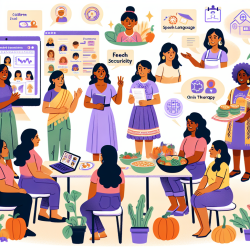Unlocking Potential: How Practitioners Can Use Research to Support Vulnerable Youth
The COVID-19 pandemic has highlighted the vulnerabilities of minority communities worldwide, particularly among Egyptian and Roma adolescents in Albania. A recent study published in Frontiers in Psychology provides valuable insights into the risk behaviors and well-being of these youth, emphasizing the need for intervention and prevention efforts that align with the Positive Youth Development (PYD) framework. This blog explores how practitioners can utilize these findings to enhance their practice and support vulnerable youth effectively.
Understanding the Research
The study examined 201 Egyptian and Roma adolescents, focusing on their risk behaviors, well-being, and developmental assets during the pandemic's first wave. The findings revealed high levels of risk behaviors and low well-being among these youth, with significant gender differences. Boys reported more risk behaviors, while girls exhibited higher family assets and social competencies. Notably, the study highlighted the critical role of positive identity in enhancing well-being.
Key Takeaways for Practitioners
Practitioners can draw several actionable insights from this research:
- Focus on Positive Identity: The study underscores the importance of fostering a positive identity among minority youth. Practitioners should incorporate strategies that help adolescents build a positive self-concept and envision a hopeful future.
- Address Gender Differences: Tailor interventions to address the distinct needs of boys and girls. While boys may benefit from programs targeting risk behaviors, girls might require support in leveraging their social competencies and family assets.
- Enhance Contextual Assets: Strengthening family and neighborhood support is crucial. Practitioners should work with communities to create safer environments and improve access to resources.
- Adopt a PYD Approach: Embrace a PYD framework that views adolescents as resources to be developed rather than problems to be solved. This perspective can guide the design of interventions that empower youth and promote resilience.
Encouraging Further Research
The study's findings also highlight the need for ongoing research to better understand the unique challenges faced by minority youth. Practitioners are encouraged to collaborate with researchers to explore the effectiveness of different intervention strategies and contribute to the growing body of knowledge in this field.
By integrating these insights into practice, practitioners can play a pivotal role in supporting the positive development of vulnerable youth, ultimately leading to better outcomes for these communities.
To read the original research paper, please follow this link: Risk behaviors and well-being among Egyptian and Roma adolescents in Albania during the COVID-19 pandemic: Vulnerability and resilience in a positive youth development perspective.










